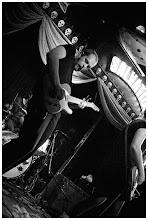Control was a relentless criticism of puritan morality and commercialism in the form of a story that follows a corporate executive through unseemly affairs that ultimately end in his murder by his estranged wife. It's a bizarre love story that ends in tragedy, and along the way no character is spared, from the lover that promises his fiancee "I would never divorce you without a good reason," to the unfaithful husband calling down rapture, complete with Jesus and his angles, at the moment of the his orgasm with his mistress, to the wife obsessed with getting her face on "the cover of a magazine," to the children contemptuous and undisciplined, to finally, the priest at the funeral who proclaims, "We're all going to die. It could twenty years, it could be tonight. Lately I have been wondering why we go through so much trouble to prolong the pain of being alive." The record ends with the narrator's disparaging conclusion: "Wouldn't it be so wonderful if everything was meaningless? But everything is so meaningful and most everything turns to shit."
The record gave a name to everything I was feeling at the time. I had been made irrelevant by my religion, a belief structure that supported the very policies I was against. My reading and the lectures I was attending reflected the record's scathing criticism of consumerism, corporate greed, and harmful environmental policy. And while Control stops short of being a cry to arms against the conservative ethos that was "evil" in the context of the record, the implications were clear to anyone that was listening. Bazan was onto something wholly other than his own upbringing in the Christian church. Control was the tipping point not only for Bazan, but one that inspired and incited me. Little did I know at the time Bazan and I were about to go in two divergent directions.




No comments:
Post a Comment